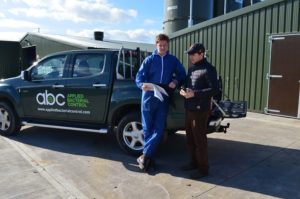 St David’s Poultry Team, which pioneered a unique approach to reducing antibiotic usage in livestock, has launched a new company specialising in optimising farm animal health.
St David’s Poultry Team, which pioneered a unique approach to reducing antibiotic usage in livestock, has launched a new company specialising in optimising farm animal health.
Applied Bacterial Control (ABC) will work with farmers to help reduce antibiotic usage across all livestock sectors, by boosting animal health through a bespoke programme involving husbandry protocols and products in biosecurity, hygiene, water sanitation, probiotics and essential oils. Working with all sections of the supply chain, ABC focuses on improving the gut health of the animals.
Having initially focussed on reducing antibiotic use in poultry, the veterinary team branched into the pig sector in 2016, and is now rolling out the protocol to ruminants as well.
“We are all facing a crisis in antibiotic resistance and this is now climbing to the top of many political agendas,” explains director Richard Turner. “Farmers are under increasing pressure to reduce antibiotic use, but without additional support the concern is that animal health and welfare will suffer. We now have five years of practical experience working with farmers and using alternatives to antibiotics, and felt the time was right to consolidate those solutions into one unique company offering practical solutions that farmers can implement.”
ABC brings the individual specialisms of industry experts under one umbrella, offering a truly holistic approach to optimising animal health and reducing the need for antibiotic treatments.
“Scientific understanding of the microbiome – the complete package of cells that make up any animal – has advanced a huge amount in recent years,” says Mr Turner. “It’s now clear that animals are 90% bacterial cells and only 10% their own, and the interaction between these cells is delicately balanced to achieve optimum animal health.”
Varying conditions can change this balance, leaving the animals more at risk of disease, and therefore in need of antibiotic treatment. “However, by maximising the quantity of healthy bacteria, and preventing the ingress of ‘bad’ bacteria, we can naturally boost the animal’s own immune system, leading to improved productivity and reduced medical intervention,” explains Mr Turner.
Antibiotics are a vital tool in controlling disease in animals and humans, and it’s essential that vets can continue to use them when required, he adds. However, it’s equally important to reduce unnecessary usage by looking at the whole farming system.
“This approach is proven to work in poultry and pigs, and through ABC we are now rolling it out across the ruminant sector to aid both farmers and their livestock. Only by adopting such a holistic approach can the industry safely reduce antibiotic use to the ultimate benefit of our wider society.”



